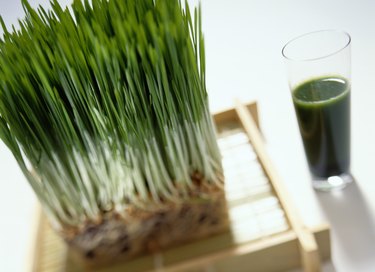
Wheatgrass, chlorella, spirulina and barley grass are all plants that can be taken as supplements, pills or in juice form. Incorporating these foods in the diet can be part of a healthy diet, but the purity of ingredients in supplements are not regulated by the US Food and Drug Administration. These plant supplements may have certain health claims that do not have scientific evidence and are not supported by the FDA.
Wheatgrass
Video of the Day
Certain health claims of wheatgrass include helping the immune system fight off infections and colds, improving joint pain, skin disorders and constipation. The American Cancer Society points out that almost no human clinical studies support claims made for wheatgrass or wheatgrass diet programs, and there is no scientific evidence that wheatgrass can cure any diseases. Wheatgrass is high in vitamins, minerals and fiber. It can be used as a serving of vegetables, and it is commonly juiced to a drinkable liquid. It can also be sold in pill form, juice or liquid extract.
Video of the Day
Chlorella
Chlorella is also called green algae and is commonly used in Japan to treat a variety of health conditions including cancer and strengthening the immune system. Chlorella is a single-celled alga that contains a high amount of chlorophyll, which is used by plants to convert light to energy. The American Cancer Society states that currently there is no significant evidence in humans that chlorella fights cancer, but limited animal studies show that chlorella may help inhibit growth of some cancer cells.
Spirulina
Spirulina is a blue green algae that is available in pills, powder or flakes. Spirulina is high in vitamins, minerals, carotenoids and protein. According to the University of Maryland Medical Center, spirulina may help boost the immune system. Use caution with choosing spirulina supplements, as this blue green algae can be contaminated with harmful toxins and heavy metals. Consult a medical professional for proper amount to take and before taking supplement, as it can interfere with medications. It is also contra-indicated in certain medical conditions such as phenylketonuria, a rare birth defect, and autoimmune diseases.
Barley Grass
Barley grass is made from the young green leaves of the barley plant. Barley grass may assist in lowering cholesterol, as it is rich in fiber. There is insufficient evidence for claims of barley grass aiding in cancer prevention. Barley grass should not be consumed by people with celiac disease or in hyper-sensitive people. Consult with a medical professional before taking supplement.